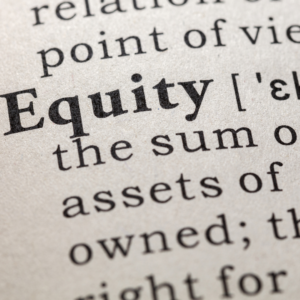How does your homes equity play in mortgage refinancing?

Home equity is one of the key things you’ll need to mull over if you’re thinking about refinancing your mortgage. Home equity, in a nutshell, is the share of your home’s value that you own outright—it’s the contrast between your home’s market value and the unpaid balance on your mortgage.
The amount of equity you have in your home will have a big impact on whether or not refinancing makes sense for you. If you have a lot of equity, you could potentially get a lower
What is home equity?
Home equity is the market value of your home minus any outstanding loan balances. For example, if your home is worth $250,000 and you have a mortgage balance of $100,000, you have $150,000 in home equity.
Home equity, in a nutshell, is the part of your house that you outright own—or would if you sold the property and paid off your mortgage—after subtracting any outstanding loan balances.
How can home equity be used in mortgage refinancing?
Home equity can be extremely beneficial when you’re ready to refinance your mortgage. In fact, a lot of homeowners use their home equity to finance large purchases, such as home repairs or renovations, college tuition, medical bills, or even a second home.
If you have equity in your home, you could potentially use it to refinance your mortgage and get a lower interest rate. Mortgage refinancing can also give you the chance to lengthen the term of your loan, which would lower your monthly payments.
You will need to have enough equity in your property when you refinance your mortgage in order to qualify for the new loan. The amount of equity you have will decide the loan-to-value ratio (LTV) of your new loan. The LTV is the proportion of the loan amount to the appraised value of your home. For example, if your home is worth $200,000 and you owe $150,000 on your mortgage, your LTV would be 75%.
You will typically need an LTV of 80% or below to be eligible for a refinanced mortgage with a lower interest rate. If your LTV is above 80%, you could still qualify for a refinance, but you may have to pay private mortgage insurance (PMI).
When you’re ready to investigate mortgage refinancing options, have a conversation with a loan officer at your financial institution to learn more about how home equity can be used during refinancing.
What are the benefits of using home equity in mortgage refinancing?
Home equity can be extremely beneficial if you’re wanting to refinance your mortgage. Some advantages of using home equity in mortgage refinancing are:
Home equity can potentially secure you a lower interest rate on your new mortgage, which can save you money in the long run.
Home equity can also help you pay off your mortgage faster by increasing the amount you’re able to finance.
-Refinancing your mortgage with home equity can give you extra cash to use for other things, like home repairs or renovations.
What are the risks of using home equity in mortgage refinancing?
There are risks associated with using home equity to finance mortgage refinancing, such as owing more than your home is worth if the value of your home decreases, or having difficulty making payments if your income decreases.
How to decide if using home equity in mortgage refinancing is right for you
You could take out a mortgage or home equity loan to get cash for a big purchase or to pay off other debt.
It’s crucial that you understand the advantages and disadvantages of each option before making a decision. When you refinance your mortgage, you’re taking out a new loan to replace your current mortgage. The reasons for doing this might be to get a lower interest rate, tap into your home equity, or switch from an adjustable-rate mortgage to a fixed-rate mortgage. A home equity loan is when you borrow against the value of your home and use it as collateral for the loan.
There are some risks associated with both options. With mortgage refinancing, you could end up paying more in interest if rates rise over time. And if you can’t keep up with payments, you could lose your home to foreclosure. With a home equity loan, you could also end up losing your home if you can’t repay the debt. So it’s important to consider all the risks before making a decision.
If you’re considering either of these methods to get cash, speak to a financial advisor first. They can help you understand all your options and ensure that you’re making the best decision for your specific circumstances.
How to get the best deal when using home equity in mortgage refinancing
Home equity is the portion of your home’s value that you own outright, and it can be used as collateral for a loan. The more equity you have, the lower your loan-to-value ratio (LTV) will be, which can give you a better interest rate and terms on your refinance loan. When you’re looking to get the best deal on mortgage refinancing, it’s important to understand how your home equity plays a role.
When considering a refinance loan, lenders will also take your debt-to-income (DTI) ratio into account. This ratio is calculated by dividing your monthly debt payments by your gross monthly income. A lower DTI ratio will improve your chances of being approved for a loan and may also help you get a better interest rate and terms.
To get the best deal on a mortgage to refinance a loan, it’s important to compare rates and terms from multiple lenders. It’s also a good idea to have at least 20% equity in your home, as this will help you avoid paying private mortgage insurance (PMI) on your loan.
What to do if you can’t get a good deal when using home equity in mortgage refinancing
If you’re looking to use the equity in your home to score a great deal on mortgage refinancing, you may be let down. Although home equity can be a powerful bargaining tool, it’s not always easy to get lenders to give you a fair price.
If you find yourself in this predicament, there are a few things you can do. To start, try shopping around. It’s possible that the right lender just hasn’t been found yet. Secondly, look into other refinancing options, such as government programs or private lenders. Lastly, don’t be afraid to negotiate. If you have good credit and a strong argument for why you deserve a lower interest rate, you might get what you want.
How to make the most of using home equity in mortgage refinancing
Homeowners can use their home’s equity to their advantage by refinancing their mortgage. A new loan with a lower interest rate can be taken out, consolidating debts and potentially saving thousands of dollars over the life of the mortgage. However, with all the different options available, it can be tough to know how to best take advantage of this opportunity.
Use these tips to make the most out of home equity when refinancing your mortgage:
- Research to get the most competitive rates. The interest rate you’re given will differ based on the lender you select, similar to any other loan. Therefore, it’s important to compare rates from various lenders before making a choice.
- Ensure you have enough equity. You must have a minimum of 20% equity in your home to qualify for a home equity loan or line of credit. If you lack that much equity, you might still be able to refinance your mortgage, but you may end up having to pay for private mortgage insurance (PMI).
- Weigh the costs. There are certain costs that come with mortgage refinancings, such as closing costs, appraisal fees, and origination fees. Make sure you take these into account before making a final decision.
It’s key to be aware of your objectives before you begin the refinancing process. Do you want to lower your monthly payments? Pay off your mortgage more quickly? Get money for home improvements? When you know what you hope to achieve, you can select the option that will help you reach those goals.
| MortgagesToGo.ca | |
| Website | Mortgagestogo.ca |
| Services | New purchase, refinancing and equity takeouts, mortgage transfer, mortgage renewal Rates |
| Rates | https://mortgagestogo.ca/mortgage-rates/ |
| Address | 12 Royal Vista Way NW #1110, Calgary, AB T3R 0N2 |
| Contact Details | (888) 888-5998 |
| Operating Hours | Monday – Friday 9 AM – 5 PM |








